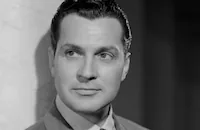Ghost Town
Brief Synopsis
Cast & Crew
Allen Miner
Kent Taylor
John Smith
Marian Carr
Serena Sande
John Doucette
Film Details
Technical Specs

Synopsis
The passengers on board a Missouri Western stagecoach, bound for the Rimrock Station, include Anse Conroy, a businessman; Doc Clawson, a drunken veterinarian; Simon Peter Wheedle, a preacher and Barbara Leighton, an Easterner traveling west to meet her fiancé, Duff Dailey. As the stage approaches Rimrock, Duff and his partner, Kerry "Crusty" McCabe, successful gold prospectors, are also heading to the station to meet Barbara. When they arrive, Duff and Crusty discover that the station has been destroyed by Cheyenne and Arapaho Indians. Consequently, when the stage reaches the station, the driver decides to move on immediately. Although Duff and Barbara had planned to go to San Francisco, Duff agrees to join Crusty in riding lookout for the stage. On board, Wheedle, who is sympathetic to Indians, suggests that a white man probably caused the attack by plying the Indians with liquor. When Barbara inadvertently reveals that Duff was formerly a Boston newspaper reporter who came west two years earlier to look for gold, Conroy begins to doubt his ability to protect the stage. Soon after, Sgt. Ben Dockery, a cavalry officer, and his young son Alex approach the stage and tell the driver that a thousand Cheyenne are on the warpath and have wiped out the station for which they were headed. The group then heads north to try to avoid the Indians, but soon comes under attack. When both drivers are killed, the stage careens out of control and Duff jumps aboard and brings it under control. As the stage approaches a ghost town, the Indians suddenly withdraw, after capturing Doc. The group then takes shelter in a deserted saloon where Duff surmises that the Indians did not follow them into the town because they think it is cursed. Duff later discovers evidence that the townspeople may have died due to an epidemic. When Conroy learns that Duff and his partner are carrying small sacks of gold, Duff warns him that he sleeps very lightly. After Conroy then implies that Barbara may be only interested in his gold, Duff is evasive when she asks him about its value. That night, while checking the horses, Duff finds an old Indian and a young woman hiding in the stable. The woman, Maureen, tells Duff that she is the man's adopted daughter and that he is Fire Knife, chief of the southern Cheyenne. Because the three peace treaties Fire Knife made with the army were followed by attacks on his people, his tribe regards him as a traitor and has removed his tongue as punishment. Fire Knife and Maureen, part Irish, part Cheyenne, are now outcasts and are trying to reach the northern Cheyenne. Duff takes both Fire Knife and Maureen to the saloon, where they encounter hostility from Dockery and others. All is quiet until a group of Indians attack the saloon and a lengthy gunfight erupts. When the Indians leave, Maureen states that the Indians obtained their weapons from Conroy and accuses him of being a gunrunner. During another attack, Wheedle, convinced that he must tell the Indians that the whites are their friends, leaves the saloon and is killed by an Indian bullet. Duff then decides that someone should go to Fort Killdeer for help, but rejects Alex's offer to volunteer. After Conroy tells Barbara that he has devised a plan to escape with Duff's gold, she agrees to join him and they embrace. In the morning, the group discovers that Alex has left for the fort. Three Indians, led by Dull Knife, enter the town under a flag of truce and propose safe passage west in exchange for Fire Knife. The Indians then withdraw after stating they will return soon for an answer. When Dockery notices Alex's gun in Dull Knife's belt, he collapses, fearing the worst. After Duff tells the others that he has no intention of handing over Fire Knife, Conroy pulls out a revolver and demands Duff's gold. As he is about to leave, Conroy double-crosses Barbara by leaving her behind with Duff. After Conroy departs, Duff tells the distraught Barbara that he switched the contents of the sacks during the night and those that Conroy stole are filled with dirt. When Conroy discovers the deception and returns defeated, Barbara mocks him. Dockery then reveals that he is a deserter who ran away because he was about to be court-martialed for leading an unauthorized attack on the Cheyenne. After Duff rejects Barbara, he and Maureen become interested in each other. When Dull Knife returns, the group is surprised to see Fire Knife surrender voluntarily, placing his own life in jeopardy to save the others. Maureen tells Duff that Fire Knife had signalled her in sign language that Duff's actions had given him hope that there might yet be peace between their peoples. Later, as Conroy and Barbara board the stage together, Dockery states that he is returning to the fort to stand trial and Maureen decides to stay with Duff.

Director
Allen Miner
Cast

Kent Taylor
John Smith
Marian Carr
Serena Sande

John Doucette
Joel Ashley
Gilman Rankin
Gary Murray
Edmund Hashim
Chief Ted Nez
William "bill" Phillips
Crew
Angela Alexander
Bud Andrews
Joseph F. Biroc
Jameson Brewer
Jack T. Collis
Arden Cripe
Louis Dewitt
Paul Dunlap
Joe Edmondson
Wesley V. Jefferies
Martin Kashuk
Howard W. Koch
Bill Neff
Milt Olsen
Marshall Pollock
Mike Pozen
Jack Rabin
Aubrey Schenck
Nina Vine
Mary Westmoreland

Film Details
Technical Specs

Quotes
Trivia
Notes
This film was shot near Kanab, UT. Some of the cast and crew began the film upon completion of Quincannon, Frontier Scout, which was also shot near Kanab (see below). Despite having a prominent role, actor William "Bill" Phillips received no onscreen credit and was billed fifth after John Doucette, whose role was considerably smaller, in the film's press advertising.












